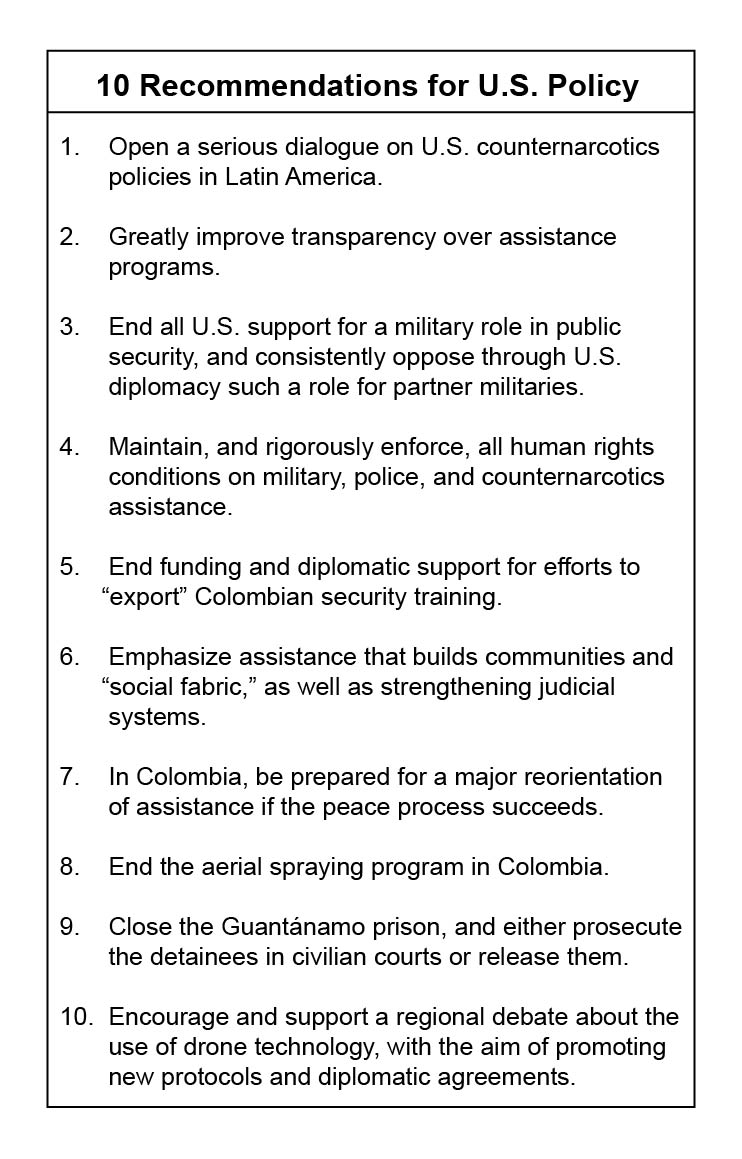The United States’ diplomatic influence is ebbing in Latin America and the Caribbean. U.S. military influence, though, remains strong. The result is inertia, a policy on autopilot, focused on security threats and capabilities at a time when creativity is badly needed.
Moving in a more constructive direction would not be difficult. It could start with simply listening to what Latin American government and civil-society leaders are saying. The clamor for a new relationship is loud, but still falling on deaf ears.
That is the overarching theme of Time to Listen, a new publication from the Latin America Working Group Education Fund, the Washington Office on Latin America, and the Center for International Policy. It is the latest in these groups’ series of publications about trends in U.S. security relations with Latin America and the Caribbean. These can be viewed here. Crammed with statistics and graphics, Time to Listen guides readers through today’s trends on the U.S. security relationship with Latin America.
Please click here to read the full publication.
Para leer la publicación en Español, favor haga clic aquí.
The three groups maintain a database of U.S. aid programs to the region. They find U.S. assistance today to have dropped near the lowest levels in more than a decade – about US$2.2 billion foreseen for 2014. But dollar amounts are deceptive. While “big ticket” aid packages like Plan Colombia and the Mérida Initiative are running their course, other, less transparent forms of military-to-military cooperation are on the rise.
- Special Operations Forces, whose budgets are not being cut and who have less role to play in Iraq and Afghanistan, are deploying more frequently to Latin America for training and other missions.
- U.S. personnel are working alongside Central American and Caribbean security forces to patrol their coasts and jungles. Disturbingly, some of these counternarcotics operations have led to the deaths of civilians.
- U.S. funds are sending Colombian soldiers and police to train with thousands of counterparts around the region.
- And as new unmanned technologies begin to proliferate around the continent, the U.S. use of weaponized drones elsewhere in the world has set a dangerous precedent.
While military-to-military relations remain robust, the U.S. diplomatic effort is flagging. That is partially due to budget cuts and a more intense focus on other parts of the world. But much of it has to do with a failure to listen to Latin American leaders’ growing calls for change.
These calls are loudest in the realm of drug policy. “In the past year and a half, thanks to Latin American initiatives,” notes Time to Listen, “drug policy has been on the agenda at the United Nations, Summit of the Americas and Organization of American States.” For the first time, sitting presidents are calling for alternatives to the punitive, military-heavy “war on drugs” approach that the U.S. government has promoted, with little or no success, for 40 years.

But these calls aren’t being heeded. The vast majority of U.S. security assistance continues to flow through counter-drug funding
programs: eradicating the crops of the poorest, transferring weapons and lethal skills to institutions with recent records of human rights abuse, and encouraging militaries to take on civilian policing roles. And today, U.S. security forces are increasing their direct participation in interdiction operations—some of them rather violent—on other countries’ soil, especially in Central America and the Caribbean. Despite calls for change, U.S. drug policy in Latin America looks much as it has since the 1980s and 1990s.
There are partial, and encouraging, exceptions. On human rights, Washington occasionally sends the right message. U.S. diplomats pushed back, with partial success, against Colombia’s attempt to reduce civilian courts’ jurisdiction over cases of military human rights abuse. The State Department has helpfully sided with regional leaders who wish to preserve the Inter-American human rights system. And in the last two years the Obama administration, prodded by Congress, has begun introducing changes in applying the Leahy Law that could result in improved future enforcement.
Still, the Obama administration’s human rights messages continue to be contradictory. For example, the administration is promoting a role for Colombia’s security forces in training other nations’ police and military despite grave abuses that remain unpunished. The U.S. government has been troublingly silent about recent human rights abuses in Honduras. And the example of the Guantánamo Bay detention center remains as a prominent reminder to the region of the superficiality of the U.S. commitment to human rights.
The Obama administration deserves praise for officials’ public statements about Colombia’s ongoing peace process, which have been consistently supportive. We must hope that this helpful tone continues once the process reaches a point at which the United States might be required to take actions, like reorienting aid or acquiescing to changes in drug policy resulting from the talks.
It would not be hard to break out of the current moment of paralysis, to begin treating this hemisphere as one of opportunities instead of potential threats. But it would require the Obama administration to do something that Washington has rarely done in the history of U.S.-Latin American relations: to listen to the region’s leaders and civil societies. That is the thread woven through the report’s ten recommendations for an improved U.S. security relationship with Latin America.
Time to Listen is a product of the “Just the Facts” project, a collaboration between CIP, LAWGEF, and WOLA dating back to 1997. Together, we monitor all forms of U.S. military and police aid to Latin America and the Caribbean.
Soon, the project’s name will change: the Center for International Policy, in partnership with several non-governmental partners, is taking “Just the Facts” global. The resource currently hosted at www.justf.org will become the Latin America section of Security Assistance Monitor at www.securityassistance.org, a site documenting U.S. security assistance to every region of the world. Stay tuned for our upcoming launch.

